“So many of our dreams at first seem impossible, then they seem improbable, and then when we summon the will, they soon become inevitable.” (Christopher Reeve)
Everyone loves a superhero. Superman and Spiderman are classics, Deadpool is a personal favorite, but for our purposes Iron Man is the most relevant. Unlike Clark Kent, Peter Parker, or Wade Wilson, Tony Stark has no innate superpowers. No, his is the story of how technology can transform a flawed human into a superhero.
We like to think of our tech as a mighty exoskeleton, an Iron Man suit of sorts, cloaking our people in superhuman powers. It’s ludicrous, of course. Juvenile even. But two years in, it’s a little less Incredible.
I say this based on our ‘Automation Index.’ This tracks the ratio of customers to team members. Two years ago today we had 96 customers and 21 people on staff: our Automation Index stood at 5. Today, we have under 100 team members and over 250,000 customers, and the Index reads 2,500:
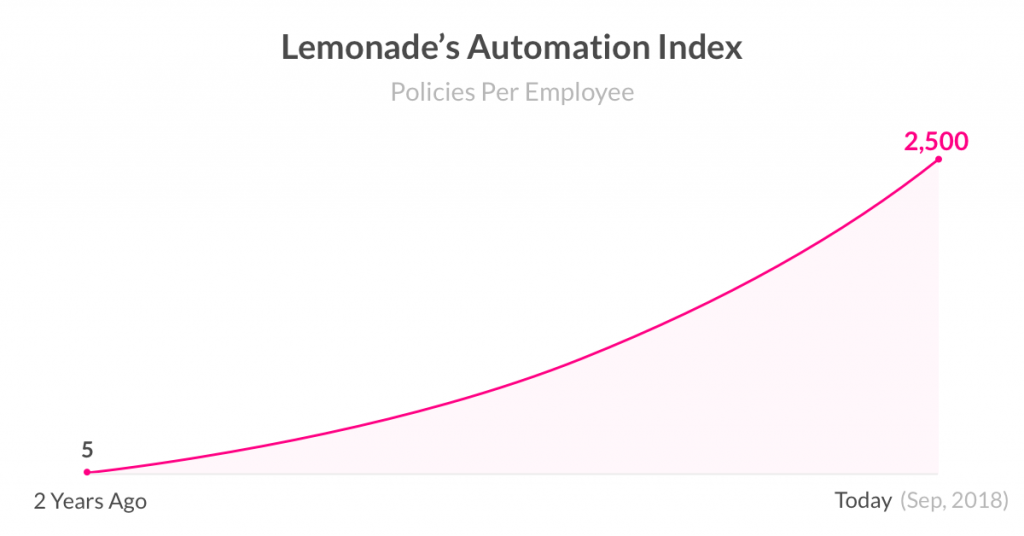
To put that number in perspective, consider that most efficient legacy insurance carriers have about 1,200 policies per employee, and most lag much further behind:
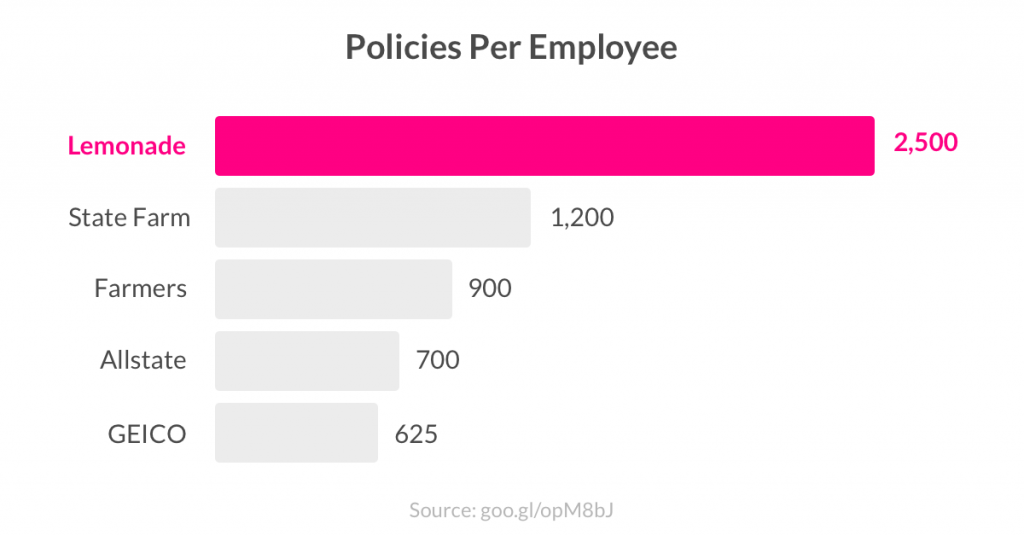
And that’s only if you close one eye and squint with the other. You see, taking ‘employees’ as the denominator makes insurers appear more efficient than they really are, because ‘agents’ are a huge part of their workforce without being ‘employees.’ Likewise, taking ‘policies’ as the numerator overstates the ‘customer’ part, because most customers have more than one ‘policy.’ Once we adjust for these, the picture is even more stark:
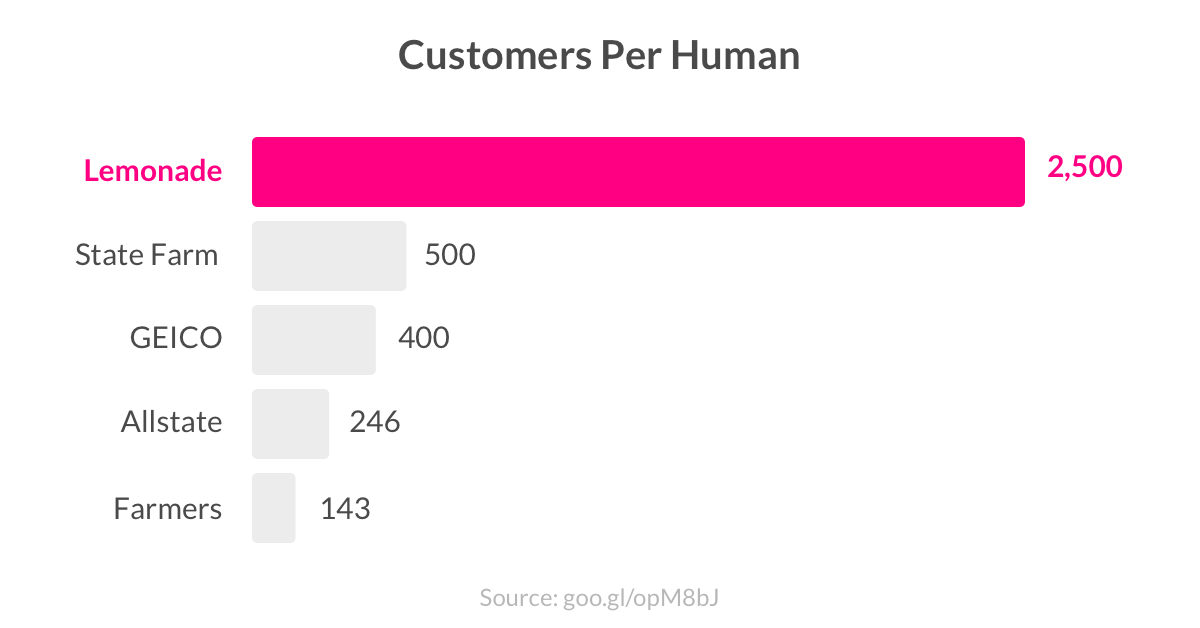
It’s tempting to dismiss this as an anomaly ‘because Lemonade is still small,’ but it’s the other way around. Look at the chart above: Farmers – the company with the lowest Automation Score – has fewer customers than Allstate and GEICO, and all three are significantly smaller than State Farm. You see, being small makes you less efficient. The fact that ‘Lemonade is still small’ makes that 2,500 number all the more Iron-Manish.
In fairness, using the Automation Index to compare Lemonade to incumbents is imperfect. Most of Lemonade’s customers bought renters insurance – a relatively simple product – while our competitors often sell more complex products. But while it may be flawed, the story the Automation Index tells seems directionally correct. For one, we’re seeing similar efficiencies when handling more complex products, like homeowners insurance. For another, the Automation Index actually handicaps Lemonade more than it does incumbents.
How? It’s obvious when you think about it: incumbents are in ‘maintenance mode’ – the most efficient state of being. The majority of their customers had zero contact with them in the past 2 years, and their systems, headcount, licenses, and technologies hardly changed during that time.
Our own experience couldn’t be more different:
Startup mode is the most inefficient state of being. If we’re hitting 2,500 on the Automation Index now, I think it’s likely we’ll double that number in the next 2 years, and then double it again.
Wonder Woman’s Secret
What’s the secret? Consider Maya. Maya is a real person, with a full time job and a wonderful young family, yet her alter ego manages to sell an insurance policy every 60 seconds, 24 hours a day, seven days a week. ‘AI Maya’ had millions of conversations in the past two years – thousands of them concurrently. And rather than getting tired, she’s just getting started: most days she handles more customers than she did the previous day, with no sign of letting up. Human Maya is a licensed agent and a wonderful woman, but to become a superwoman she dons that exoskeleton.
And it’s not just Maya. Jim does the same thing when handling claims, while Cooper (our Jarvis wannabe) runs much of the company’s back office, providing underwriting, finance, and R&D with their own exoskeleton (see Shai’s post on the Rise of the Autonomous Organization).
Super Happy?
It’s easy to have a high Customer to Human ratio if you’re willing to let customer satisfaction pay the price. “Your call is important to us and will be answered in the order in which it was received” is a magic formula for high-efficiency-low-customer-satisfaction. Which begs the question: Is Lemonade’s efficiency achieved at the expense of customer satisfaction?
The answer is ‘no.’ The beauty of technology is that it can improve efficiency and customer satisfaction concurrently. When AI Jim pays a claim in 3 seconds, without involving human Jim, he’s being super efficient and delighting consumers. And it’s showing up in the numbers: clearsurance.com, ‘the trusted and independent voice of the insurance consumer’, tracks customer satisfaction for the 270 companies in the US offering renters insurance. Get this: Lemonade ranks #1.
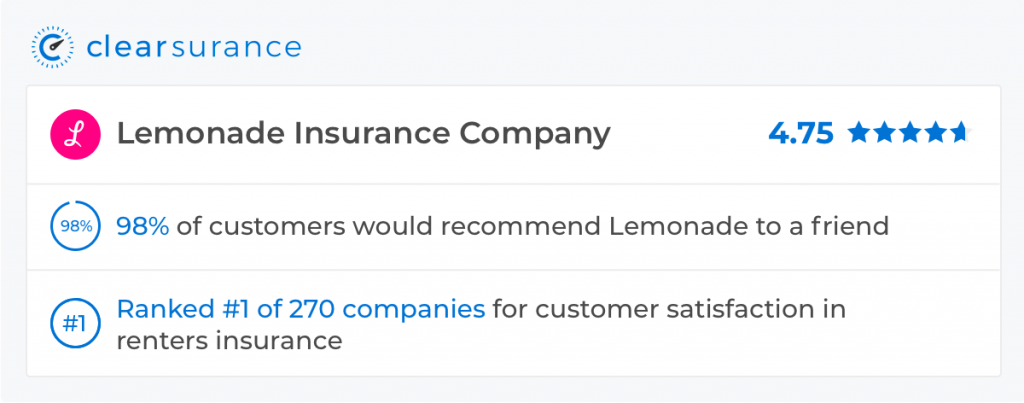
Here’s another datapoint: our team closely tracks NPS (Net Promoter Score, a universal measure of customer satisfaction), and at over 70 we’re seeing customer satisfaction levels unheard of in insurance, and usually the preserve of venerable companies like Apple.
I like to think that Mr. Incredible – the only superhero to work in insurance – would be proud.
Subpar vs. Super
“Sometimes you gotta run before you can walk” (Iron Man)
Our focus on delighting customers through technology makes the Automation Index and NPS scores the most important performance indicators for us. But not all metrics have been so super – and on several key measures our performance was distinctly subpar.
Lemonade has a unique business model, where we take a flat fee and Giveback leftover money to nonprofits. We do this in order to avoid being conflicted with our customers, and achieve this through a novel reinsurance structure. The upshot of this is that if we have too many claims, these are paid for by our reinsurance partners, ensuring Lemonade has a constant and healthy net “loss ratio.”
But the fact that our reinsurance agreements protect us from too many claims can’t hide the fact that, since launch, we’ve paid out more in claims than we’ve collected in premiums. Clearly, that can’t continue indefinitely.
The good news is that we seem to have turned a corner.
Insurance is the business of using data from the past to divine how many claims people will have in the future. And so, while our early results kept us on our toes – they didn’t surprise us. Our competitors had a hundred years of data; we had zero. Over the past two years, as we’ve signed up more customers and handled more claims, we’ve graduated from relying on the proverbial ‘wild-ass-guesses’ to the more credible ‘educated guess.’
“Lemonade has shown the most dramatic improvement in its underwriting results”
(IBNR Weekly #34, Vol. XXV)
Encouragingly, our loss ratio dropped by half from H1 2017 to H1 2018, and while it’s still too high, a similar progression in the year ahead will get us to where we need to be.
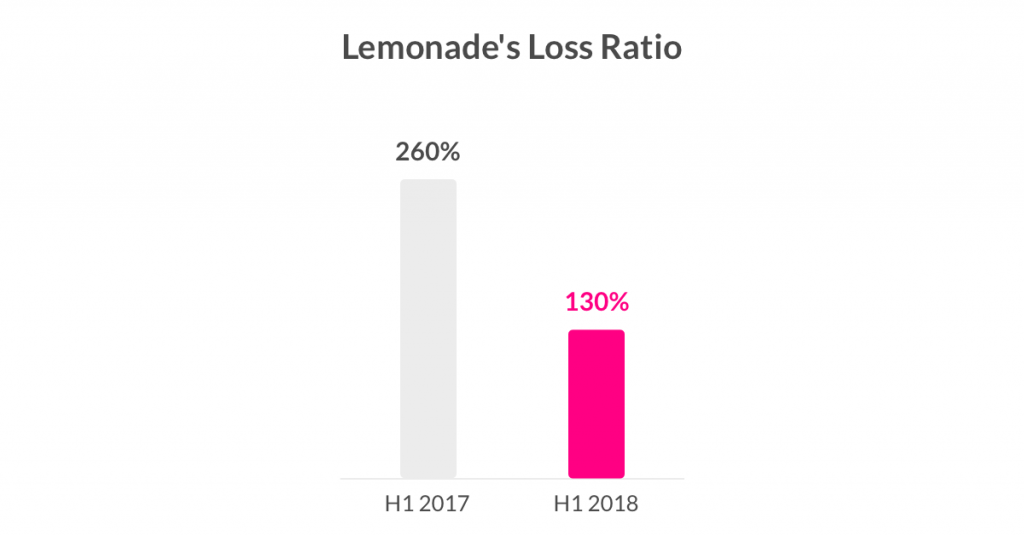
The disadvantages of being a new insurance carrier are obvious: data paucity. But there are advantages too. Being built from scratch on a digital substrate means we collect about 100X more data than traditional carriers. That’s why it won’t take us a hundred years to reach data-parity with incumbents. We guesstimate we’re 12-24 months away, and well-placed to outperform incumbents thereafter.
Ant or Ant-Man?
Two years in market, Lemonade has over a quarter of a million active customers, an annualized run rate of $80m in sales and continued hypergrowth. In areas we’re licensed we’ve gone from being unknown to the 3rd most googled brand for renters insurance (after State Farm and GEICO), and the #1 choice among first time buyers. Our customer acquisition costs remain surprisingly low; our conversion rate remarkably high. Contrast that with where we were 2 years ago, and we couldn’t be happier.
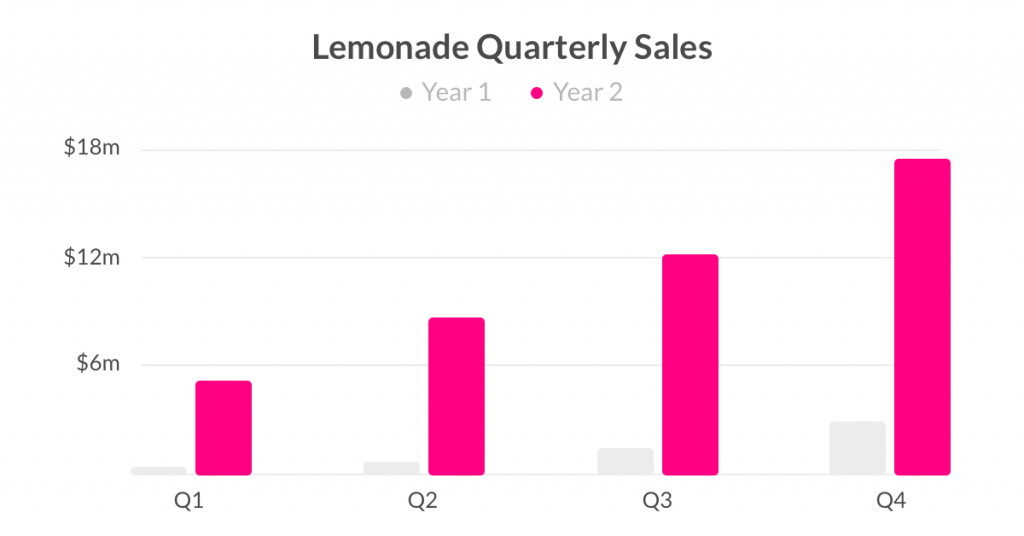
But when we compare it to our ambition for the company, we clearly have a lot of growing to do. We aspire to make Lemonade into one of the preeminent global brands of the 21st century, and by that measure we’ve barely made a dent.
The bottom line?
We’re a precocious two year old, with a superhero fixation, and the crabby octogenarians think we make too much noise.
In other words, everything is as it should be.